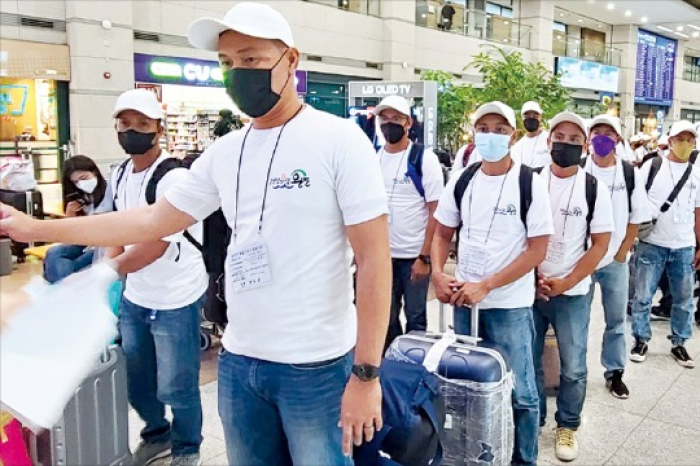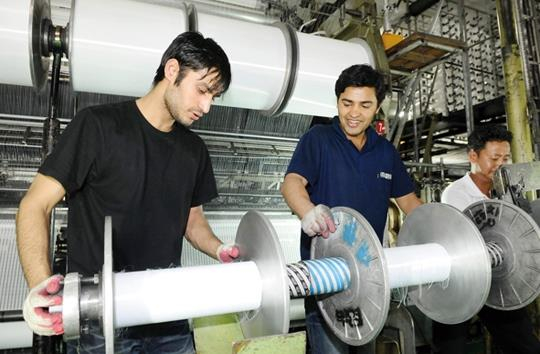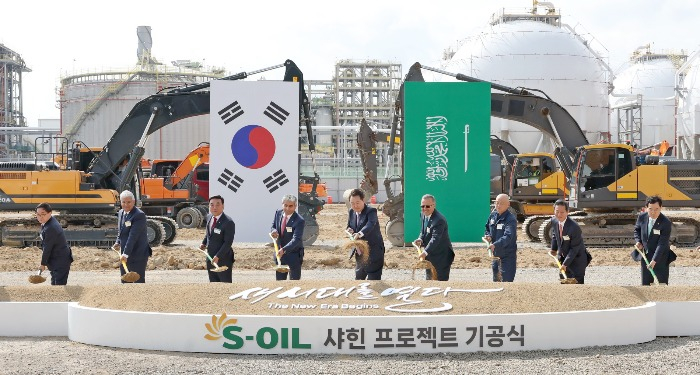Construction
Korea gives the nod for foreign workers at plant construction sites
Foreigners have long been banned from working at petrochemical, steelmaking and power plants for security reasons
By Feb 14, 2024 (Gmt+09:00)
3
Min read
Most Read
LG Chem to sell water filter business to Glenwood PE for $692 million


Kyobo Life poised to buy Japan’s SBI Group-owned savings bank


KT&G eyes overseas M&A after rejecting activist fund's offer


StockX in merger talks with Naver’s online reseller Kream


Mirae Asset to be named Korea Post’s core real estate fund operator



South Korea is expected to allow foreigners to work at plant construction sites nearly two decades after non-native Koreans were banned from those places due to security and technology leakage risks as Asia’s No. 4 economy grapples with a labor shortage.
According to the construction site industry on Wednesday, Korea’s Office for Government Policy Coordination, Ministry of Trade, Industry and Energy, Ministry of Employment and Labor and Ministry of Land, Infrastructure and Transport recently agreed to allow foreigners with E-9 or H-2 visas to work at petrochemical, steelmaking and power station construction sites in the country.
Under the agreement, the Korean government plans to remove those construction sites from the list of the country’s so-called “important national facilities,” which could seriously threaten national security if any of them is occupied, destroyed or malfunctioned by an enemy or any of their technologies is leaked.
Those facilities include public institutions, airports, ports, harbors and major industrial facilities as well as petrochemical, steelmaking and power plants that have not been accessible by foreign workers since 2007 when the government designated them as “important national facilities.”
If the plant construction sites are removed from the list, up to 20,000 non-Korean nationals are expected to be deployed at 12 plant construction sites across the nation this year.
“Concerns were raised that 12 major plant construction projects costing a total of 52 trillion won ($39 billion) could suffer a setback due to a labor shortage,” said a government official.

As foreign workers are expected to be tasked only with simple jobs such as cleaning and material management at the construction sites, they will unlikely to have access to sensitive security or technology information, the official added.
The Korean government, however, will encourage companies to hire Korean nationals first for jobs at those facilities and then fill any shortfall with foreign nationals.
LABOR SHORTAGES
Korean plant companies are expected to welcome eased restrictions surrounding foreign labor employment at their plant construction sites after years of suffering labor shortages.
The Korean plant industry needed 146,788 workers last year but could only hire 134,100.
S-Oil Corp., the Korean unit of Saudi Arabian Oil Co., is expected to be the first company to benefit from the upcoming change.
The company is estimated to need about 17,000 construction workers daily in the second half of this year for its over 9-trillion-won project, called the Shaheen project, which is building facilities at the company’s main plant in Ulsan to manufacture petrochemical products.
When completed in 2026, the plant will have an annual production capacity of 1.8 million tons.

But the plant’s construction and engineering companies have not yet developed a field worker management plan due to a labor shortfall a year after they broke ground on it.
SK Geo Centric Co. is also building a power plant and plastic recycling facilities costing about 1.5 trillion won, while others are building battery manufacturing plants in North Gyeongsang Province and Chungcheong Province, as well as offshore wind power farms in South Jeolla Province and metropolitan areas near the country’s capital Seoul, which cost 15.8 trillion won in total.
The lifting of restrictions on foreign workers at plant construction sites comes after the government last year already allowed the shipbuilding industry to hire foreign workers to fill the void.
The country has brought in 14,359 foreign workers to the shipbuilding industry after expanding the E-9 visa quota to an additional 5,000 foreign workers.
Korea issues E-9 visas to migrant workers hoping to have jobs in Korea that require manual or nonprofessional labor.
However, the plant construction union under the Korean Confederation of Trade Unions, Korea’s biggest umbrella labor union, held a rally on Wednesday, opposing the government’s plan to allow foreign workers at plant construction sites.
It criticized that foreign workers will take away jobs from young Koreans and warned of organizing protests against the plan across the nation.
Write to Woo-Sub Kim and Si-On Park at duter@hankyung.com
Sookyung Seo edited this article.
More to Read
-
 EarningsS-Oil’s 2023 operating profit more than halves on weak refining margins
EarningsS-Oil’s 2023 operating profit more than halves on weak refining marginsFeb 02, 2024 (Gmt+09:00)
3 Min read -
 Culture & TrendsS.Korea needs 35,000 additional foreign workers: study
Culture & TrendsS.Korea needs 35,000 additional foreign workers: studyJan 08, 2024 (Gmt+09:00)
1 Min read -
 EconomyS.Korea to allow hiring of foreign workers in hotels, resorts
EconomyS.Korea to allow hiring of foreign workers in hotels, resortsDec 29, 2023 (Gmt+09:00)
1 Min read -
 EconomyKorea to raise unskilled foreign worker visa quota to record high
EconomyKorea to raise unskilled foreign worker visa quota to record highNov 27, 2023 (Gmt+09:00)
3 Min read -

-
 Shipping & ShipbuildingS.Korea launches foreign worker quota exclusively for shipbuilding sector
Shipping & ShipbuildingS.Korea launches foreign worker quota exclusively for shipbuilding sectorApr 25, 2023 (Gmt+09:00)
1 Min read
Comment 0
LOG IN


